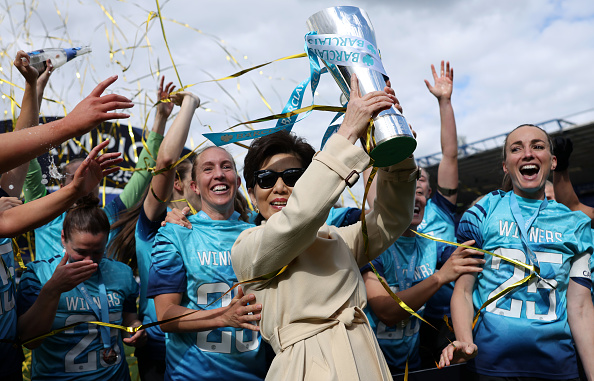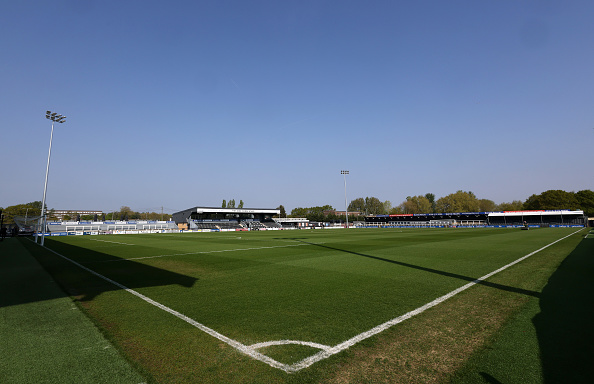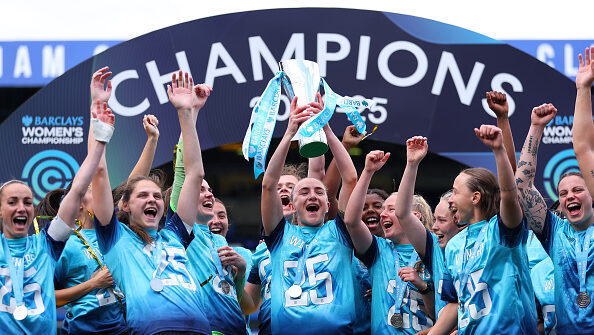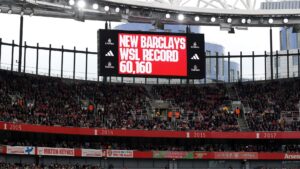On Sunday, London City Lionesses clinched the Women’s Championship (WC) title – and with it, a coveted spot in next season’s WSL – after a dramatic 2-2 draw against Birmingham City.
The South London side only needed a point on the final day to finish first, and goals from Isobel Goodwin and Chantelle Boye-Hlorkah ensured they got over the line. Birmingham rallied in front of a record 8,749 fans and even pulled level late, but the Lionesses held on to secure promotion and spark jubilant scenes. More importantly, this five-year-old club became the first team unaffiliated with a men’s club to ever reach the WSL– a historic promotion that many in the women’s game thought impossible until now.
From breakaway beginnings to big-time believers
London City Lionesses’ journey has been anything but ordinary. The club was founded in 2019 after a split from Millwall’s women’s team, establishing itself as a completely independent entity separate from any men’s club.
Starting out in the Championship, the Lionesses steadily built their credentials. They’ve spent the last five seasons in the league, even finishing as high as second and third in recent years (though only the champion earned promotion). After a dip to eighth place in 2023/24, the club underwent a transformation that set the stage for this year’s triumph.
That transformation began off the pitch. In December 2023, American businesswoman Michele Kang acquired London City Lionesses, bringing a new level of ambition – and resources – to the project.
Kang installed former PSG coach Jocelyn Prêcheur as head coach and even lured Swedish star Kosovare Asllani (a former Manchester City and Real Madrid forward) to the squad, signalling the club’s intent to compete with the elite.
Suddenly, the once-modest independent club had world-class pedigree in the dugout and on the field. As this season proved, that backing paid off: London City rose from mid-table to Championship winners in just one year.

The Women’s Championship 2024/25 final league table
Why This Promotion Matters More
The Lionesses’ promotion is more than just a feel-good underdog story – it’s a moment with cultural and emotional resonance for women’s football.
In England, every other WSL team is tied to a traditional men’s football club, benefiting from those brands, fanbases and finances.
London City’s ascent directly challenges the myth that a women’s club needs a men’s side behind it to succeed.
This achievement comes at a time when women’s football is surging in popularity and investment. The Lionesses have shown that a club dedicated solely to the women’s game can not only compete but thrive – even against rivals backed by big money. (Notably, Birmingham City – the team London City edged out – have NFL legend Tom Brady as a minority owner).
The symbolism of an independent club reaching the WSL is huge: it offers a new model of success that could inspire other women-only teams in the UK and beyond. As veteran Lionesses defender Megan Campbell put it, at London City “there’s no ceiling for this club… when you’ve got someone [like Kang] in charge, the world’s your oyster”. In other words, the barriers that once limited women’s teams are starting to fall.

“When I first came to England and bought London City, a lot of people were concerned for me and were saying: ‘How can she do this? There’s no men’s team, you need a men’s team to draw the brand power, fanbase and resources – an independent team can’t do it.’ Well, we are proof that, with the proper investment and focus, anything is possible.”
Kang, when interviewed by Talksport after securing promotion
The Michele Kang Effect

Much of London City’s remarkable rise is tied to the vision (and wallet) of Michele Kang. Kang, 65, is a South Korea-born, U.S.-based tech entrepreneur who made her fortune in healthcare IT.
Now a billionaire investor in sports, she has been described as “the first tycoon of women’s football”. (Forbes currently pegs her net worth around $1.2 billion).
Kang isn’t new to the game – she already owns the NWSL’s Washington Spirit and France’s eight-time Champions League winners Olympique Lyonnais Féminin. All three clubs (Washington, Lyon and London City) are now housed under her company Kynisca Sports International, which aims to share sports science, technology and scouting across a global women’s football network.
From the moment Kang took charge in London, she made her ambitions clear. “We’ve been building the team to be mid-tier WSL, at a minimum, on day one,” she said, eyeing a squad capable of immediately competing in the top division. She has also made no secret of her intention to turn the Lionesses into a Champions League force.
This bold approach meant heavy investment: Kang broke second-tier records to sign talent like striker Isobel Goodwin (reportedly for a fee in excess of £100,000) and didn’t shy away from high-profile moves such as the Asllani deal. It’s a level of support rarely seen outside the orbit of men’s clubs. Head coach Prêcheur has praised Kang’s commitment, saying people cannot fully grasp what she’s doing right now for women’s football.

Financial Boost and the Road Ahead
Earning promotion unlocks new opportunities – and challenges – for this women’s-only club. On the financial side, WSL membership brings increased media exposure and revenue.
Starting in 2025/26, the WSL will enjoy a historic new broadcast deal that will see nearly 90% of matches televised, with major sponsors and TV money following. London City Lionesses can also expect bigger crowds at their Bromley home ground and greater commercial interest now that they’re a top-flight side.
The club will likely receive a significant cash injection from Kang herself to bolster the squad. “It’s actually going to be much easier to recruit,” Kang noted, since many top players were reluctant to join a second-division team – a barrier that no longer exists. In fact, Kang vowed to get to work first thing on Monday morning after promotion, already drawing up plans to strengthen the squad for the WSL.
Still, realism tempers the excitement. The gap between the Championship and the WSL is large, and the most recent promoted teams (Bristol City and Crystal Palace) both struggled to make the jump and were relegated after one season. “I’m not naive – I know the gap is huge between the Championship and the WSL. After [celebrating] I’ll go back to work,” coach Prêcheur said of the challenge ahead.
Survival in their first WSL campaign will be priority one. The Lionesses will have to compete against well-funded giants and adapt quickly to a higher level of play. But with Kang’s backing, the club is already targeting more than just survival – they intend to rattle the established order. Kang has stated her goal is to be at least mid-table from the start, and build upward from there. For a club that didn’t even exist six years ago, that kind of talk is audacious – and inspiring.
New Chapter for Women’s Football
London City Lionesses’ rise is a watershed moment that extends beyond one team. It poses a direct challenge to the status quo of the women’s game, proving that women’s football clubs can chart their own path to the top.
The emotional impact of this promotion is palpable among fans who have long hoped to see a women’s side succeed under its own banner. It also arrives amid a broader movement pushing for greater investment, equality and visibility in women’s sports. The Lionesses have provided a proof of concept: with the right leadership, talent and support, a women-only team can reach the pinnacle on merit – and stay there.
In the coming WSL season, all eyes will be on London City to see if they can consolidate their place and perhaps even upset some of the big names. Their presence alone sends a message that might energise other independent teams (current or future) to dream big.
As Kang put it, this promotion is “proof that… anything is possible”. The Lionesses have roared their way into the WSL, and in doing so, they’ve opened the door for a new era where success in women’s football isn’t reserved for those with a men’s club attached. That’s a victory which resonates far beyond one season or one club – it’s a statement to the entire sport that the future of women’s football can stand proudly on its own.
The question now is, will this be the kick-start needed to a rise in the number of independent women’s teams? We certainly hope so.







